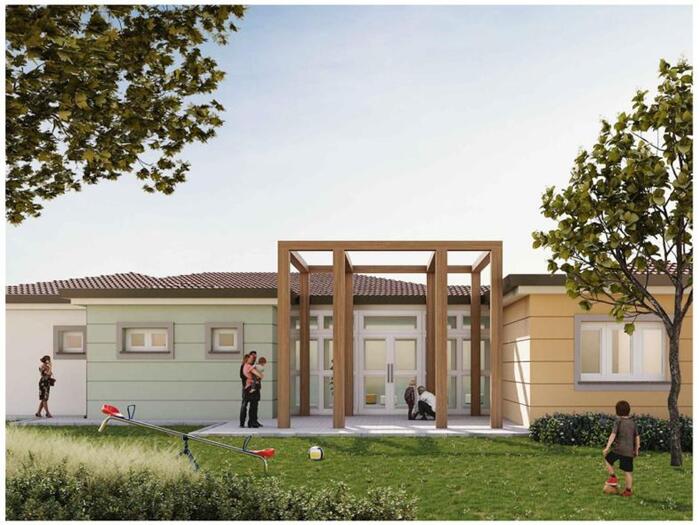More than half of the nurseries are not qualified for this
Half of the caregivers leave in the first year, a small number of supervisors, the rich get a subsidy and my poor children stay at home.
These are just some of the flaws found by the State Comptroller in examining the care of dormitories and nurseries.
Findings of the auditor's report
Uri Sela
10/05/2022
Tuesday, 10 May 2022, 15:08 Updated: 15:58
Share on Facebook
Share on WhatsApp
Share on Twitter
Share on Email
Share on general
Comments
Comments
In the video: The nursery school principal and her home are suspected of abusing toddlers during a court hearing (Photo: Yoav Itiel)
More than half of the caregivers who educate in daycare centers do not have official training, according to the State Comptroller's report today (Tuesday) on the care of toddlers and their education in day care centers and nurseries.
According to the report the situation is not going to change any time soon: if the current rate of training continues, it will take at least 20 years to catch up with the gap between the professional training required by the Dormitory Supervision Act and the current situation.
The report's findings show that only 5% of caregivers in need of training receive it, due, among other things, to difficulties in accessing courses and difficulty in devoting time to participating in online courses.
Comptroller Netanyahu Engelman emphasizes that the state is not doing enough to solve the problem, and has so far contented itself with developing an online course and incentives for the organizations that operate the supervised dormitories, Symbol Dormitories.
Another problem presented by the auditor is the high turnover of facts.
More than half of them leave in the first year of taking office, and between 35% and 48% of all caregivers change each year, according to data collected by the organizations operating the supervised dormitories in the previous three years.
Organizations attribute the mass abandonment to paid caregivers, who are usually content with a minimum wage with meager extras.
They warned that they identify less quality care for toddlers, who have difficulty adapting to the frequent changes in staff.
Also in the auditor's report: The
death toll from double work accidents from Europe, failures in the implementation
of enforcement
Good to know (promoted)
This button can save your life in case of a medical emergency
Served on behalf of Shahal
Difficulty accessing training courses.
Children in daycare (Photo: Flash 90, Moshe Shai)
The lack of training and the high turnover could have been covered, to some extent, by close supervision of the dormitories.
However, more than 5,000 day care centers operating in Israel have only 25 supervisors, according to the report.
"Although day care centers for toddlers need at least the same level of supervision, guidance and accompaniment as kindergartens of the Ministry of Education, and possibly even more so due to the starting point of most of them (staff without training, for example), at the end of the audit. "And the threshold requirements from the inspectors on them are not in line with the threshold requirements from the inspectors of the Ministry of Education," the auditor notes.
The Comptroller recommended to the Ministry of Education to increase the number of supervisors as soon as possible, to formulate additional models for the training of caregivers, including financial incentives, and to improve their situation in order to prevent the drop-out of dormitories.
Subsidy for the rich
Disabilities in the operation of dormitories may raise questions among parents of toddlers, but many of them can not at all afford to think about it.
The document published by the Comptroller's Office shows that 20% of the places in dormitories that offer a controlled price do not reach the population that needs a subsidy.
All discounted dormitories can accommodate about 30% of about 548,000 toddlers from birth to three living in Israel, and the rest of the parents are forced to bear high costs, some of which are impossible.
52% of toddlers live in localities with a low socio-economic rating - between clusters 1 and 4.
However, the report highlights the mismatch between the economic situation in the locality and the number of supervised dormitories.
Thus, the Jerusalem District has 2.3 times more residents belonging to the clusters lower than the center, while the number of dormitories is a quarter lower.
In Arab society, where the poverty rate is relatively high, the gap is even more severe: 24% of toddlers are Arabs, but only 8% of the subsidies reached them in 2020.
However, the trend is positive, with the rate of subsidies to Arabs rising by 13% in 2013.
"The audit showed that although education for toddlers is a crucial step in creating equal opportunities, in practice the deployment and subsidy mechanism of the symbol frameworks leaves many families in a low socio-economic situation without the possibility of benefiting from a symbol framework, where the price is monitored and tuition subsidy; "Many serve a socio-economically strong population, which in fact receives a benefit in the form of a regulated price, which is generally lower than the market price of dormitories in their area of residence," Engelman concluded.
"It is recommended that the day care department, in collaboration with the Ministry of Finance, examine the subsidy model against the background of the impact of the new Supervision Law on the dormitory market to enable more families in low socioeconomic status to provide their children with quality care.
Change the subsidy mechanism.
State Comptroller Engelman (Photo: Mark Israel Salem)
The Ministry of Education stated in response that "the auditor's report refers to the period in which the day care centers have not yet been transferred to the responsibility of the Ministry of Education.
The transition strengthens the field and allows the series and treatment of existing buyers.
The transition allows the education system to create an educational and systemic sequence from birth to age 18. This sequence is tailored to the needs of the child at all stages of his education, growth and development.
It also allows the Ministry of Education to set quality educational standards, while continuously monitoring and supervising their educational activities.
In light of this, since the transfer of the day care centers to the responsibility of the Ministry of Education in January 2022, it has expanded and deepened the supervision of the day care centers, recruits dozens of new supervision standards and begins a process of comprehensive and comprehensive training of all caregivers.
In addition, the ministry is embarking on a process of building new dormitories, which will expand the scope of families receiving subsidies.
The ultimate goal is to transfer the age of birth to 3 to a regulated educational system with full subsidy for all families in Israel.
news
News in Israel
Education
Tags
State Comptroller









/cloudfront-eu-central-1.images.arcpublishing.com/prisa/6S7ZRJSVMJHOVNOIZWQSQ375RA.jpeg)

/cloudfront-eu-central-1.images.arcpublishing.com/prisa/KMEYMJKESBAZBE4MRBAM4TGHIQ.jpg)



